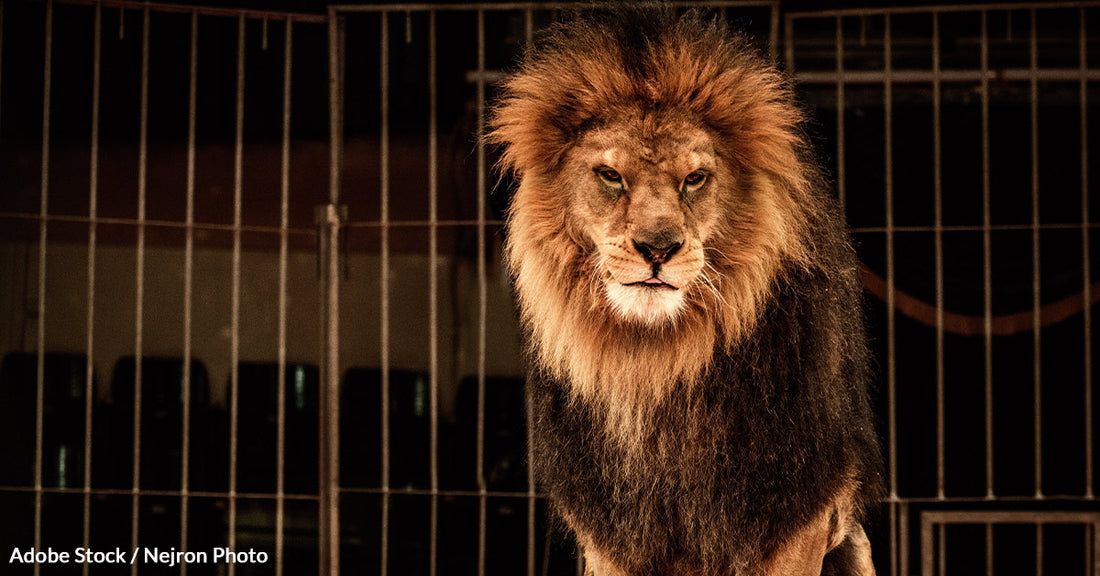Victory for Animal Rights as Massachusetts Bans Exotic Animals in Circuses
Matthew Russell
Massachusetts has taken a significant step in animal welfare. The state House and Senate have passed a bill prohibiting the use of elephants, big cats, and other exotic animals in circuses and traveling shows.
This legislative move marks the culmination of a prolonged campaign by animal rights activists who have argued against the cruelty inflicted on these animals.
The bill, which emerged amid a series of animal-centric proposals, passed unanimously. If Governor Maura Healey signs it into law, Massachusetts will become the eleventh state to adopt such a ban, the Boston Globe reports.

The Plight of Circus Animals
Wild animals in circuses face grim conditions. They spend most of their days in cramped cages, deprived of their natural behaviors. Forced to perform frightening and sometimes painful tricks, these animals often endure a lifetime of misery.
As The Animal Legal Defense Fund reports, the Commerford Zoo, a Connecticut-based traveling circus, exemplifies these issues, with over 50 violations including inadequate veterinary care and poor sanitation. Two elephants from this zoo died in 2019 under questionable circumstances.

Legislative Journey
Animal rights activists have long pushed for this legislation. During the 2019-2020 legislative session, advocates rallied at the Massachusetts State House, pressing lawmakers to act. Their persistence paid off, leading to the unanimous vote in the House on July 25, 2024. According to WHDH,
Senators Bruce Tarr and Adam Gomez, along with Representatives Bradley H. Jones and Carole Fiola, sponsored the bill. The proposed law, known as "An Act Relative to the Use of Elephants, Big Cats, Primates, Giraffes, and Bears in Traveling Exhibits and Shows," now awaits Governor Healey’s signature.

Momentum Across the Nation
Massachusetts joins a growing list of states adopting similar bans. Eight states and nearly 150 localities in 37 states have enacted restrictions on the use of wild animals in circuses. This movement reflects a broader shift in public sentiment against the exploitation of animals for entertainment.
The successful passage of this bill in Massachusetts could inspire other states to follow suit. Activists hope that the momentum will continue to build, leading to nationwide reforms. States like California, New York, and New Jersey have already implemented bans, setting a precedent for others to emulate, the New Boston Post reports.

The Traveling Exotic Animal and Public Safety Protection Act
The Traveling Exotic Animal and Public Safety Protection Act (TEAPSPA) represents a beacon of hope for animal welfare advocates. By amending the Animal Welfare Act, TEAPSPA aims to restrict the use of exotic and wild animals in traveling circuses and other traveling acts across the United States, reports Animal Defenders International.
Similar to the legislative actions in Massachusetts and other states, TEAPSPA would protect wild animals from the severe confinement, lack of exercise, and forced performances that characterize circus life. This bill not only targets the inhumane treatment of animals but also addresses public safety concerns associated with unpredictable wild animals in traveling shows.
The goal of TEAPSPA is to create a consistent, nationwide standard that ensures the humane treatment of all animals, reflecting the growing public sentiment against their exploitation for entertainment

Public Support and Advocacy
The public's growing awareness of animal rights issues has played a crucial role in advancing these legislative efforts. Advocacy groups at the forefront have been providing research and mobilizing support. Their efforts have highlighted the harsh realities faced by circus animals and garnered widespread support for bans. The Massachusetts bill also includes specific exemptions, reports the Boston Globe.
Permanent residents at facilities and animals used in permitted motion picture filming are not affected. These exemptions ensure that the law targets the most egregious cases of animal exploitation while allowing legitimate uses to continue.

A Step Toward Ethical Treatment
The passage of the bill by the Massachusetts House and Senate represents a significant victory for animal rights. It signifies a collective acknowledgment of the inhumane conditions faced by animals in circuses and traveling shows. This legislation not only protects these animals but also sets a precedent for other states to follow.
As Massachusetts awaits Governor Healey’s signature, the hope is that this bill will spark similar actions nationwide. The growing momentum indicates a shift toward more ethical treatment of animals, reflecting changing societal values and increasing awareness of animal rights issues.
Click below and sign the petition to protect exotic animals from exploitation throughout the United States!

